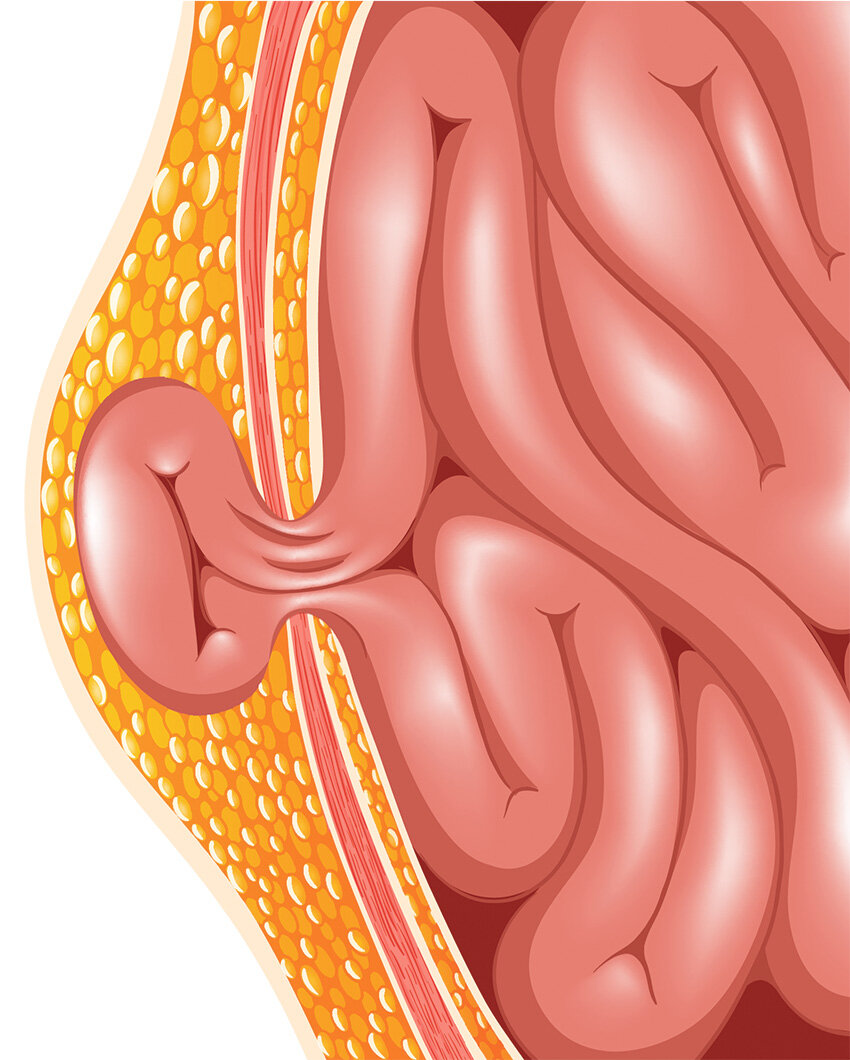Hernia Surgery
Hernias are common in men and women however many people put off treatment for a hernia until it becomes large, unsightly or painful resulting in an emergency situation. Sunnybank Surgical is an experienced group of specialist surgeons performing open and keyhole hernia surgery across Brisbane including the Redlands and Logan areas.
Ask your GP for a referral or speak to your consulting doctors in the emergency department about having your hernia surgery done by one of our specialist hernia surgeons.
What is a hernia?
A hernia is a bulge or swelling of the abdominal wall where a weakness in the muscle, tissue or membrane has caused some of your abdominal content (eg fat or intestine) to push through. Hernias are more common in certain parts of the body where weak points exist, such as the groin or around the belly button.
Scar tissue and muscle weakness from previous operations can also make hernias more likely to occur. Hernias affect both men and women – although certain types (eg inguinal hernias) are much more common in men.
Do I need surgery for my hernia?
Hernias usually start with a small lump, pain, discomfort or a dragging sensation. When they are small, they can often be pushed back through the abdominal wall defect. Over time, hernias tend to grow bigger and cannot be reduced, causing discomfort and/or pain, and making surgery necessary.
When the contents within the hernia are constricted, they do not receive enough blood supply. This is termed strangulation and often cause significant swelling and severe pain. A strangulated hernia is a serious medical condition and requires emergency surgery.
How is hernia surgery performed?
Most types of hernias can be repaired using keyhole or open techniques as day surgery or overnight stay. Incisional hernias and recurrent incisional hernias may require advanced repair techniques and require a longer hospital stay of 3-5 days. Where open surgery is needed, special dressing with a vacuum pump may be used as they have been shown to reduce wound infection rates.
What type of hernia surgery do I need?
The type of hernia surgery you need depends on the location of your hernia. Our specialist surgeons will examine the hernia and use ultrasound or CT scans to get more information about your hernia before planning your surgery and the type of repair to use. We repair all types of hernias including:
Inguinal hernia – this type of hernia usually looks like a bulge in the groin or scrotum that comes and goes with lying or standing. It can form a hard lump that needs urgent medical attention. Inguinal hernias are most common in men.
Incisional hernia – appear after abdominal surgery where the site is structurally weaker. This type of hernia requires surgery with hernia mesh to prevent the intestines pushing through the weakened scar tissue.
Femoral hernia – occur where the torso becomes the limbs of the body. The femoral canal is a space where a large blood vessel travels down into the leg. When fat or intestine enters this space in the upper thigh, it is at high risk of strangulation. A strangulated hernia is a serious complication requiring urgent medical attention. Femoral hernias are more common in women.
Umbilical hernia – occur near the navel where the gut pushes through muscular weakness. Most commonly arising from birth in newborns, in patients who are overweight and in women after pregnancy.
Epigastric hernia – occur through the linea alba between the belly button and the bottom end of the sternal bone. Being overweight, chronic coughing or constant straining due to constipation or prostate disease are common causes.
Surgery for groin (inguinal/femoral) hernias
Keyhole (laparoscopic) surgery is most suitable for groin hernias and achieves a long-term cure rate of close to 100%
Synthetic mesh is used to form a ‘scaffold’ for scar tissue to repair the defect in the abdominal wall over time, the mesh incorporates into the scar plate and reinforces the groin
Usually performed as day or overnight surgery
Recovery involves avoiding strenuous activity and heavy lifting
Surgery for umbilical and epigastric (ventral) hernias
Ventral hernias are repaired by open or key-hole laparoscopic surgery often as a day-case or overnight stay
Avoid strenuous physical activity and heavy lifting (>5-10kg) for at least 4 weeks after surgery to avoid recurrence of your hernia
Surgery for incisional hernias and recurrent incisional hernias:
May require advanced repair techniques of component separation and hence may require a longer hospital stay of 3-5 days for pain management and to allow drains to remove tissue fluid accumulation
Where can I get emergency hernia surgery?
If your hernia has become a hard lump or becomes very painful (strangulated) this is a serious complication requiring urgent medical attention. Don’t delay seeking treatment. Visit your GP or local emergency department.
As a private patient, you can request for your surgery to be done by one of Sunnybank Surgical’s experienced hernia surgeons in your choice of hospital across Brisbane including Sunnybank Private Hospital, Mater Private Hospital Redlands and Mater Private Hospital South Brisbane.

